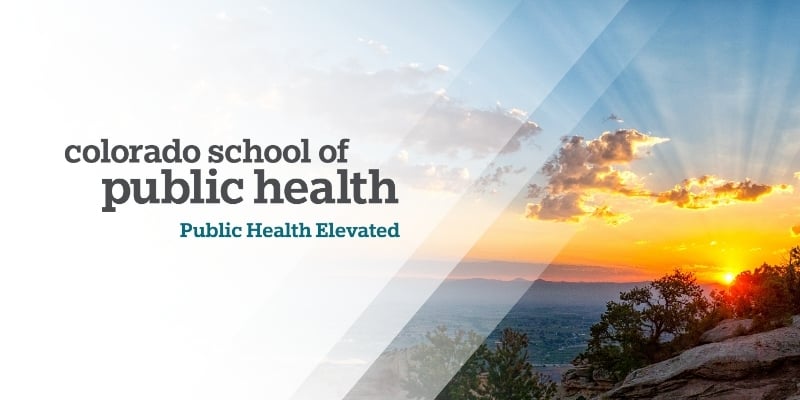I hope your holiday weekend was filled with joy and gratitude. Mine was spent with loved ones and friends (human and canine), but I also took time to reflect on current events and the political and societal landscape we face.
Once again, public health appears to be on defense. Playing defense has been public health’s legacy since we first started understanding the cause and sources of transmission of plagues and pandemics, harmful exposures such as tobacco, and injuries from unsafe practices spanning from the surgical suite to children bouncing around in the car without a seatbelt. Public health professionals have also promoted policy positions, which at the time were unpopular, but have gone on to receive considerable public support—expanding of health insurance coverage, reducing prescription drug costs, and creating smoke-free environments, to name a few.
Foundational to the Colorado School of Public Health’s work is centering public health in science and proving its impact in practice. Public health knows no party identification, nor does it have an ideology. Public health is present in the urban core and equally important to those in rural or frontier communities. Our mission is not to spar with one side or the other; it is to dispel myths and provide recommendations based on science. It is our duty to be a trusted source and impartial in our research and recommendations.
In today’s fragmented environment, combating disinformation online and in other realms is not unique nor isolated to the public health profession. However, there is another important difference from prior attacks. Today we are witnessing a backlash that is framed as a zero-sum game where benefits are unfairly distributed, and personal freedoms are infringed upon. The sense of what’s fair and what’s right riles even the calmest amongst us. Unfortunately, because of the wide net we cast in our work from the environment, policy, and personal health recommendations, we sometimes draw fire from all sides. Let’s not let science get mischaracterized as ideology. Public health, by definition, is broadly inclusive and focused on helping people regardless of race or ethnicity, religion, geography, or political viewpoints. Our research is grounded in science and our work lands spans any ideological spectrum.
What is the role of the ColoradoSPH in this all too familiar environment? Our commitment to health equity, teaching rigorous methods, and providing sound research will be unwavering. Now is the time for us to double down on scientific principles, even if some of the country’s leaders cast doubt on science and the science of public health, in particular. You’ll often hear about population health in our profession. At its core, it means everyone gets better; people are not left out because of race or ethnicity, where they live or how much they make, or even how they vote. Everyone has a right to a safe, healthy life. To realize this right, we must prepare our students as never before. Rigorous methods and science require skepticism and patience to sit with a problem, analyses that address every possible angle, and new approaches when the existing methods are not adequate. We have a responsibility to facilitate bright minds into becoming a highly trained workforce. Public health professionals must withstand new levels of scrutiny and sometimes adversity and have the fortitude to face challenges yet unknown. Likewise, our faculty must produce research supported by science, not intuition or anecdote, or to curry political favor. Science does not have a political party. It is evidence-based. Importantly, this is not a time to merely survive but thrive. Political landscapes change and we will witness many over the course of our careers. Public health endures.
So, where do we start? Tell your stories. I cannot emphasize this enough. Tell the stories of success, progress, impact, engagement, and so much more—because we are so much more. It is up to us to narrate our positive impact on the world. It is not enough to produce rigorous research, it must be interpreted and translated into real world applications. Our stories must be accessible and relatable not only to those who share our passion for research and data, but also to our family, friends, and neighbors. Our work cannot live solely in the domain of academia. Inaccessibility exacerbates inequity and could prove perilous to our cause. Our responsibility is to continually provide compelling evidence that counters the noise and demonstrates the success of our work.
Public health needs to find its voice. It can no longer be shouted down by the disinformation abundantly available to anyone who wants to seek it out. We are better off because of public health. With our stories of success, we can convince a skeptic to take a deeper dive into the science. I want us, through our stories, to move from defense to offense. Please share your stories so that we can educate people about public health.
Although we may feel under siege, we are more important than ever. Whether it is research that combats climate change or providing scholarships to students from rural communities, you can count on your Colorado School of Public Health to lead in the most pressing and relevant public health issues of our time. We are grounded in our core value of the “ART” of public health. Authenticity in our intentions, Reliability in our commitments, and Trustworthiness in our conduct. Our values of collaboration, equity, and belonging guide us in serving the greater good. Let’s lean on one another, embrace our community, and embody the spirit of possibility, another one of our values. Public health has faced challenges before and will continue to rise above and do the work. Because that’s what we do and this is who we are.
Thank you all for being part of the Colorado School of Public Health community. We value you, your work, and your partnership. Let’s not forget how much we all mean to each other.



.png)

